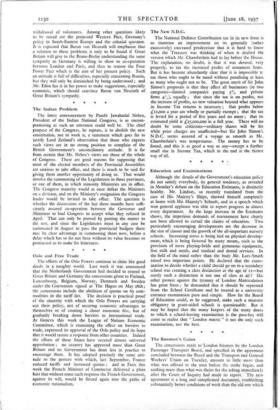The New N.D.G.- The National Defence Contribution tax in its
new form is so immense an improvement on its generally (rather excessively) execrated predeceisor that it is bard to know what the Treasury was thinking of when it drafted the version which Mr. Chamberlain had to lay before the House. The explanation, no doubt, is that it was desired, very properly, to tax the increased profits of armament firms. But it has become abundantly clear that it is impossible tc tax those who ought to be taxed without penalising at least as many who ought not to be. The great merit of Sir John Simon's proposals is that they affect all businesses (in two categories—limited companies paying 5% and private firms 4%), equally ; that since the tax is on profits, riot the increase of profits, no new valuation beyond what appears in Income Tax returns is necessary ; that profits below. £12,000 a year are wholly or partially exempt ; that the tax is levied for a period of five years and no more ; that its estimated yield is i25,000,000 in a full year. There will no doubt be some criticisms—ordinary shares will be hit while prior charges are unaffected—but Sir John Simon's N.D.C. seems assured of a voyage as smooth as Mr. Chamberlain's was tempestuous. The money has to be found, and this is as good a way as any—except a further small rise in Income Tax, which in the end is the fairest way of all.
*














































 Previous page
Previous page